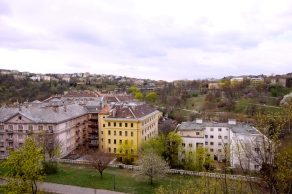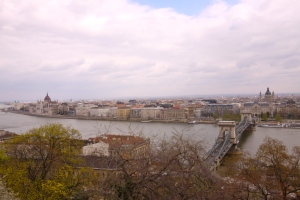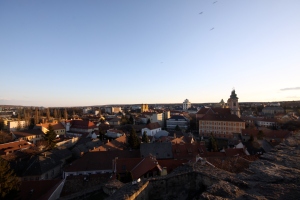Semana Santa Part I: Magyar (which is what Hungarians call Hungary)
Semana Santa is some crazy Catholic holiday that most Spanish people encourage me to participate in, but I’ve had quite enough of gaudy parades and we decided to take advantage of our ten days off and explore a bit of Eastern Europe, a region we’re really interested in but have somewhat ignored due to its inaccessibility. We flew into Budapest, arriving very late at night and wandering around lost until we found a super-friendly Irish guy who called a cab for us (for some reason they’re cheaper if you call for them instead of hailing them off the street) and we got to our host’s house at 1 AM. We were ready to go to bed, but Hungarian tradition dictated that we have a couple shots of home-made liquor, Palinka, (a pattern that would be continued throughout our vacation) with our host before hitting the hay.
The next day, our host, Ferenc, took us all around Budapest. I had been there before and prior to the vacation I was a little reluctant to return, not because it wasn’t wonderful but for precisely the opposite reason. I loved Budapest so much I didn’t want to go back and be disappointed. I wasn’t, though, and I think I could even go back a third time. Hungary is such a sad place, beautiful and bitter. The Hungarians we met were overwhelmingly friendly and welcoming, but their violent past and the fact that their country has been divided up and taken away from them has left them somewhat depressed. I don’t say this in a bad way, though, I think this mindset has led to some
amazing culture–think Gloomy Sunday, Bartok, and some of the most mind-blowing folk music you’ve ever heard. There is a darkly wistful longing for the past throughout. When we talked about how we were going up to Slovakia to visit the mountains we always heard “those used to be our mountains,” and our host’s tour included a lot of “this used to belong to my family before the communists took it away”. We were reminded that in countries where communism has actually existed, there are no communists. No one except college students and western liberals is interested in communism, which is not to say that it’s bad…it just seems that every system we’ve tried ends up completely corrupt, and communism is just one of those systems. I don’t think capitalism is working much better, but the people who have recently ousted communism might not agree. Plus capitalism begets much better architecture.
We only spent two nights in Budapest but they were interesting. We went to a metal bar–metal is big in Eastern Europe, which is somehow really fitting–where someone threw up on Austin in the bathroom, we ate in a train car that was converted into a restaurant, and we drank a huge variety of Palinka, all home-made from different orchard fruits. Our last day in Budapest we had planned to catch the train to Eger, a spa town in the north that we’d heard about. Instead our host drove us all the way there, taking the scenic route. We stopped at the palace of an Austrian queen (this one was preserved because this was a well-liked Austrian queen, unlike most of them) and in a small town celebrating the anniversary of the end of some war (there are so many, Ferenc couldn’t even tell us which war it was, but did say that it was definitely against Austria), where we watched a parade and ate traditional funnel cakes. We spent a couple hours in the hot springs in Eger and then were met by our next host, Gyorgy, who struck me as alarmingly positive for a Hungarian. We walked up to the castle of Eger, had a drink in a bar (Eastern Europeans are amazing drinkers, really), and headed back to Gyorgy’s house. Gyorgy
lives with his family on the outskirts of Eger. At first his mother was somewhat resistant to the idea of hosting strangers in her house via couchsurfing (what mother wouldn’t be?) but then she realized that she actually liked it. She insisted on making us dinner–rich, Eastern European home-cooking, of course–and pulled up a stool beside the table as we ate, having her sons translate all her typically mother-like questions–how many brothers and sisters do you have? what do their parents do?. It was positively adorable. Being raised in an Eastern-Block country, she’d had little exposure to foreigners until her son started hosting strangers in her house, and she was infinitely curious. She had never learned English since in the days of communism Russian was the obligatory second language taught in schools. Her sons’ fluency, however, was astounding. Gyorgy had also spent some time in the Canary Islands, where he learned Spanish and a bit of German. He’s also obsessed with Italy and speaks Italian fluently. Hungarians had an amazing grasp of languages because theirs is so mysterious and incomprehensible. I think the fact that we don’t even know the origins of their language is significant, symbolic. We say Hungary, they say Magyar…what the fuck? How was that decided upon? Apparently the language that is most like Hungarian is Finnish, although it really has nothing in common with Hungarian, it just sounds similar. Maybe the repeated fucking-over of the Hungarians is rooted in a deep linguistic misunderstanding…if you’re not born in Hungary, you’re very unlikely to ever learn the language. It’s extremely difficult, knowledge of other languages hardly helps since it is neither Slovak, Germanic, or Romantic, and it’s also not terribly useful. The expressions and sentiments that Ferenc and Gyorgy related to us, the way the language has poetic and very specific words for very specific feelings really piques my interest in the language but I know that there is no hope of my ever
learning it. Learning to say thank you was hard enough.
After another amazing night of wine-drinking and folk-music exploring, we had breakfast with Gyorgy’s mother and brother before heading off to the train station to catch a train to Miskolc, from where we would hitch hike up to Kosice, in Slovakia. We found some cardboard, made our sign, and wandered around the city trying to find the best way out. We finally figured it out when we found a gas station attendant who spoke english (why do Americans think they’re so great when they speak two languages? In Eastern Europe, if you speak two or three languages, you are no more qualified than anyone else for any job.) and directed us out of town. On our four kilometer walk out of town, we passed a girl who seemed to be also hitching, and we overtook her, thinking of her as competition. We sat down at a gas station, holding our sign and eating our sandwiches for lunch, when she caught up with us. She spoke to us in Hungarian but we made it clear that we couldn’t understand her, and she said ‘sorry’, and we then proceeded to communicate through gestures and a few basic English words. She indicated that we should follow her, and though we knew that hitching with more than two people would be nearly impossible, we followed her for lack of a better idea. She was talking on her phone and we were trailing behind her when she veered off of our planned path. I got her attention and gestured about how we needed to go the other way, pointing to our sign and then to the highway where we needed to be, but she said “Mom” and pointed to her destination and made a signal that clearly indicated ‘drive’. I wasn’t sure what was going to happen but assumed that her Mom was going to drive us to a good hitching spot, and sure enough, as we rounded a corner, the girl pointed to a white house and said “home”. We went into her house, she unloaded her pack and we ours, she embraced her mother and little brother, pulled a bunny out of her shirt (seriously) and handed it to her brother. Everyone said ‘hello’ to us, then installed us in their living room where we watched cartoons and were fed ice-cream, chips, juice, and cookies. I even tried to refuse some of the food but my ‘no’ was not taken very well and I was forced to eat everything given to me. The mother of the family said “Kosice?” and we said “yes”, then she said “Strasse?” and I pulled out my journal to give her the street address of our host in Kosice. She google mapped the directions and within a few minutes said ‘come on!’, loaded us into her car, and after kissing our new friend (whose name we never even learned) good-bye, we got into her mother’s car and were driven two hours into the neighboring country to Kosice. I had to fight with them (as best as I could with sign language) to get them to take my money for gas. They were concerned about dropping us off at the exact address, but google maps being what it is, we couldn’t really help them find it and just had them drop us off in what seemed to be the center. I really have no idea what that girl was doing, wandering home after an obviously long hitch-hiking trip with her tent, huge backpack, and bunny (!). Whatever she was doing, we were extremely lucky to encounter her and I cannot believe the generosity of her family, just driving two complete strangers two hours away when you clearly weren’t even headed in that direction, and not even expecting them to pay you for gas. The generosity we found in Hungary was just the beginning, a foreshadowing of sorts. Once we reached Kosice, things continued in this general pattern.







Wonderful photos. You are such a good writer. I don’t think that the job of travel writer (wouldn’t you LOVE it???) is out of reach. I love you and miss you so. Am counting down the days. xo